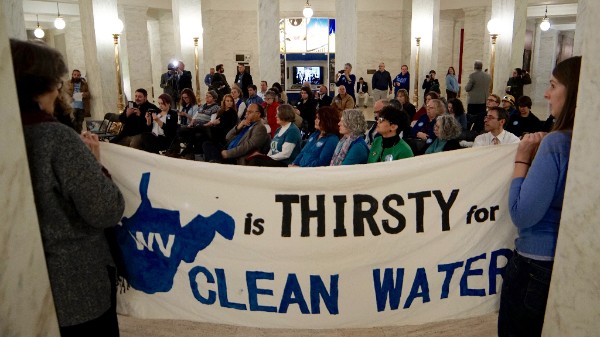FOR IMMEDIATE RELEASE
March 9, 2020
Contact: Angie Rosser, 304-437-1274, arosser@wvrivers.org
Legislature Commits to Inventory Toxins in West Virginia Drinking Water Supplies
SCR 46 passed to initiate statewide PFAS study
Charleston W.Va. – In the final minutes of its regular session on March 7, the West Virginia Legislature passed Senate Concurrent Resolution 46 to request a public source-water supply study plan to identify the potential presence of per- and polyflouroalkyl substances, or “PFAS”.
PFAS are sometimes called toxic “forever chemicals” because they do not break down and they accumulate in the environment.
These man-made chemicals are used in manufacturing a wide variety of products and are known to cause cancers and other adverse health effects. The primary exposure pathway is through drinking water.
The group of unregulated PFAS chemicals includes C8, the chemical used by the DuPont Company that contaminated the drinking water of thousands of West Virginians around Parkersburg. In that case, over 70,000 residents underwent medical monitoring, which confirmed the health hazards of PFAS. More recently, the City of Martinsburg’s Big Springs Water Plant water well closed due to PFAS contamination. Now an exposure assessment by federal agencies is underway for residents there.
“We know these toxic chemicals are already causing health problems in West Virginia; it’s good to see the Legislature recognize that we need to get a handle on the presence of PFAS statewide,” said Angie Rosser, executive director of the West Virginia Rivers Coalition. “State agencies must move swiftly to make sure more West Virginians are not at risk.”
SCR 46 was an alternative outcome to a comprehensive strategy to reduce PFAS exposure put forth in the Clean Drinking Water Act of 2020, led by Delegate Evan Hansen and Senator William Ihlenfeld. That legislation, HB 4542 and SB 679, respectively, would have set a course for setting science-based limits on the safe amount of PFAS allowed in drinking water sources and in tap water, but never was taken up by a committee.
“The results of the statewide PFAS study will help identify which community water systems are contaminated by PFAS chemicals,” said Delegate Evan Hansen, author of the Clean Drinking Water Act of 2020. “I hope the Legislature will pass the Clean Drinking Water Act next session so that the sources of PFAS contamination are identified and addressed.”
The study is anticipated to sample raw, untreated water at sites near public drinking water intakes across the state. Data collected will help inform next steps to protect the public from PFAS exposure. The legislature has not yet established a funding source to complete the study.
“This study is the important first step to making sure no more harm is caused to West Virginians by PFAS contamination,” said Rosser. “We now must look to the Governor and Legislature to make sure this study is fully funded to uncover some of the potential unknown risks we need to deal with immediately to protect public health.”





